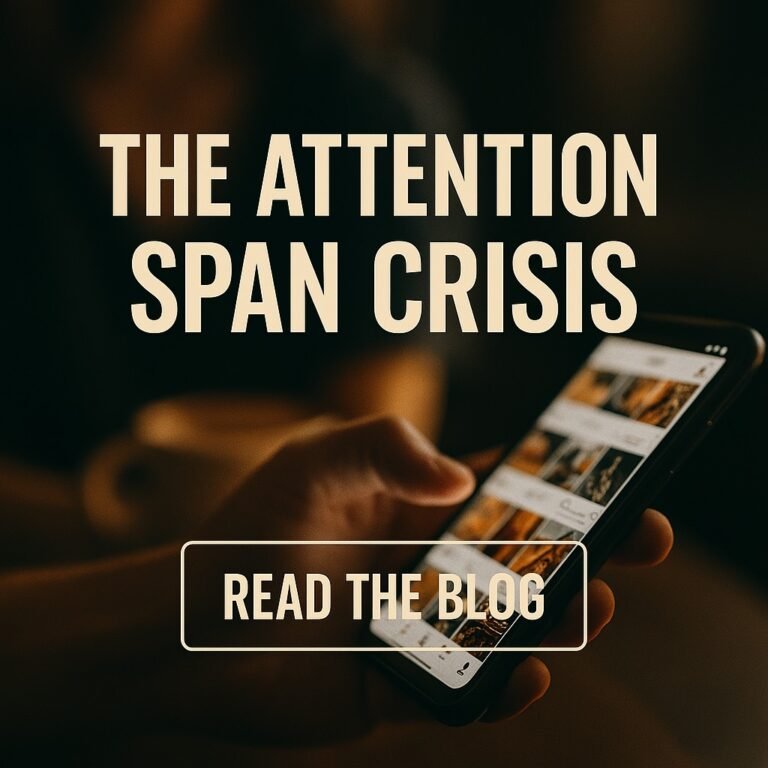
April 7, 2025
Coach G
No Comments
Do you remember the last time you sat through a classic film like “Gone with the Wind”? If you’re honest, you probably couldn’t. The movie, nearly four hours long, feels like a lifetime compared to today’s rapid-fire entertainment. This isn’t accidental. Our collective attention span has been systematically shrinking, and the repercussions are profound.
The Alarming Decline in Human Attention
Recent studies have found our attention span has dropped dramatically over the past few decades. According to research by Microsoft in 2015, the average human attention span fell from 12 seconds in the year 2000 to just 8 seconds today, shorter than a goldfish’s. Why? The answer lies in our relentless consumption culture, continuously fueled by media that encourages speed and superficial engagement.
We have become a society addicted to instant gratification. Social media algorithms are designed to deliver dopamine hits at lightning speed, movies cut scenes rapidly to maintain viewer engagement, and headlines grow increasingly sensational to grab fleeting attention. Everything must be faster because we’ve grown intolerant of stillness.
How Media and Consumerism Accelerate the Crisis
Today’s media doesn’t just reflect our diminishing attention, it actively promotes it. Films and TV series now average shot lengths of just two to four seconds, compared to the leisurely scenes of older classics. This rapid editing not only shapes our expectations but rewires our brains to demand constant stimulation.
Advertising relentlessly exploits this vulnerability, creating short, intense messages that condition us for impulsive buying and constant dissatisfaction. Consumerism depends heavily on distraction, continuous novelty keeps the economy buzzing, but at a severe psychological cost.
Psychological Consequences of Shrinking Attention
Our attention isn’t just about consuming entertainment; it’s a fundamental aspect of consciousness itself. Shorter attention spans correlate with heightened anxiety, reduced emotional resilience, and lower levels of overall happiness. When we can’t sustain attention, we fail to deeply engage with our inner lives or build meaningful connections.
Studies also highlight alarming increases in ADHD diagnoses and anxiety disorders, particularly among children. According to the Centers for Disease Control and Prevention (CDC), ADHD diagnoses increased significantly over the past two decades. This isn’t just coincidence; our environment actively fosters these conditions.
The Impact on Parenting and Future Generations
Parents today face immense pressure to entertain children constantly, with screens becoming convenient babysitters. Consequently, younger generations grow accustomed to rapid stimulation, often unable to cope with boredom or quiet moments essential for healthy cognitive and emotional development.
What does this mean for future generations? Psychologists predict greater difficulty in emotional regulation, higher rates of mental health disorders, and a compromised ability to concentrate deeply on work or learning tasks.
The Future Workplace: Fragmented and Distracted
As attention spans continue to dwindle, workplaces must adapt drastically. Already, many employers report reduced productivity and creativity due to constant digital distractions. The ability to deeply focus, essential for innovation and complex problem-solving, is becoming rarer.
This shift means the jobs and economies of tomorrow may increasingly value superficial multitasking over thoughtful, sustained efforts, altering not just how we work but how we define productivity and success.
Rest and Entertainment: A Lost Art
Rest itself is being transformed. Many now equate downtime with mindless “zenscrolling” or binge-watching, activities designed to further erode attention rather than restore it. True rest, deeply restorative, reflective, and quiet, is becoming a lost art, replaced by a constant state of hyper-arousal and exhaustion.
Entertainment, once about storytelling and emotional connection, now prioritizes quick thrills and instant gratification. Films like “Gone with the Wind,” with their extended narrative and slow-paced storytelling, feel foreign and exhausting to contemporary viewers raised on TikTok and Netflix’s fast edits.
Reclaiming Our Attention: Solutions and Hope
Is there hope? Absolutely, but reclaiming our attention requires deliberate effort. Mindfulness practices, intentional digital detoxes, structured screen-free periods, and a conscious return to slower, deeper forms of entertainment can significantly help.
Parents can make intentional choices to limit screen time and encourage children to engage in unstructured play and quiet reflection. Educators can integrate mindfulness practices into curricula to foster longer attention spans.
Ultimately, safeguarding our attention span isn’t merely about productivity, it’s about preserving our humanity. By consciously stepping back from the frenzy and choosing depth over distraction, we can reclaim our inner peace, our creativity, and our capacity to truly connect with one another.
If you’re skeptical, try watching “Gone with the Wind” tonight. Notice your reactions. Observe your discomfort. And recognize that discomfort as a wake-up call… Before it’s too late.
Let’s Keep the Growth Going
You’ve come this far for a reason. Stay connected and receive insights that meet you where you are—right in your inbox.
- Join our Newsletter -
Share:
Categories
Popular Posts
Tags
Book Summary
Coach G
Coaching
consciousness
ego
Emotional Healing
Emotional Intelligence
Emotional Resilience
empowerment
faith
forgiveness
Growth Mindset
healing
Inner Peace
law of attraction
letting go
life coach
life coach Dubai
Life Coaching
Life Coaching Dubai
Manifestation
marriage
Mental Health
Mindfulness
Mindset Shift
oneness
Personal Development
personal growth
Personal Transformation
Positive Mindset
productivity
quantum psychology
relationships
Resilience
Self-Awareness
Self-Discovery
Self-Improvement
Spiritual Awakening
spiritual coach
spiritual growth
spirituality
Success Mindset
Time Management
Transformation
Universal Laws
© 2026 Coach G Dubai. All rights reserved.




